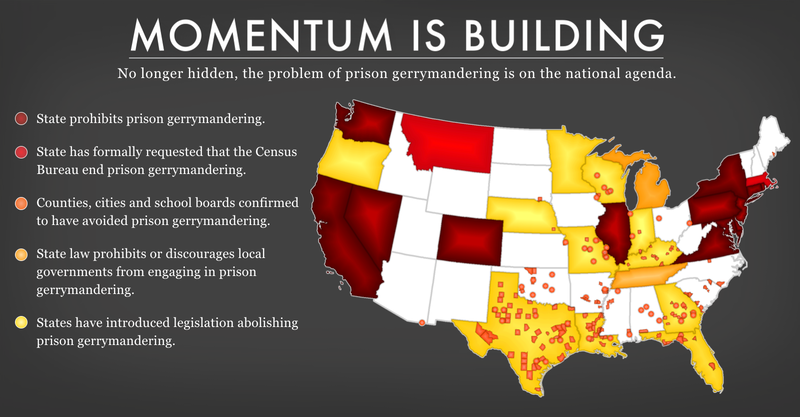Rhode Island becomes latest state to address prison gerrymandering
Gov. Dan McKee signed into law new legislative districts that count many incarcerated people in their home districts.
February 23, 2022
Another state has moved to address prison gerrymandering. Last week, Rhode Island Governor Dan McKee signed into law new legislative and congressional districts that change how the state counts incarcerated people. Rhode Island is the second state whose redistricting commission has taken the initiative to address prison gerrymandering (after Pennsylvania last year). Eleven other states have also ended the practice through legislation. All told, roughly half of all U.S. residents now live in a state, county, or municipality that has rejected prison gerrymandering.
Prison gerrymandering is a problem created because the Census Bureau erroneously counts all incarcerated people as residents of their prison cell rather than their home community. Most people in prison come from districts other than those in which they are incarcerated and return to those home districts after release. Incarcerated people typically have strong attachments to their home communities but no attachment to the community surrounding the prison. As a result, when states use Census counts to draw legislative districts, they inappropriately enhance the representation of people living in districts containing prisons.
However, unlike other states that have taken action, Rhode Island did not completely end prison gerrymandering. Instead of counting all incarcerated people at home when drawing new districts, the redistricting commission counted only people who, on Census Day (April 1, 2020), were either not yet sentenced or had less than two years remaining on their sentence. As a result, the state’s new legislative maps count only 44% of incarcerated people in their correct districts. (The change will not affect federal or state funding distributions.)
“These new districts are an important step in the fight to end prison gerrymandering in Rhode Island, but the work is not over. Lawmakers should finish the job of ending this injustice by passing legislation that will ensure the state counts all incarcerated people in their home districts when new districts are drawn in ten years,” said Aleks Kajstura, Legal Director of the Prison Policy Initiative. “Rhode Island’s actions are yet another reason for the Census Bureau to join the growing consensus on the issue and count incarcerated people as residents of their homes, not their prison cells.”

Prison gerrymandering has a particularly significant impact on communities of color in Rhode Island, where black people are incarcerated at a rate nine times higher than non-Hispanic whites, and Latinos are incarcerated at a rate three times higher than non-Hispanic whites.
The national movement to end prison gerrymandering began in 2001 when the founders of the Prison Policy Initiative discovered that the sheer size of the prison population was combining with an outdated Census Bureau rule to distort political representation in this country. Since then, more than a dozen states and over 200 local governments have taken action to address this problem.



